KU Leuven (or Katholieke Universiteit Leuven)[a][2] is a Catholic research university in the city of Leuven, Belgium.
Katholieke Universiteit Leuven[a] | |
 | |
| Latin: Universitas catholica Lovaniensis | |
Other name | Katholieke Universiteit te Leuven[b] |
|---|---|
| Motto | Sedes Sapientiae (Latin) |
Motto in English | Seat of Wisdom |
| Type | Publicly-funded Catholic university |
| Established | 1425 as Studium Generale Lovaniense (predecessor institution) 1834 as Catholic University of Belgium 1970 (split) |
Academic affiliation | CESAER CLUSTER Coimbra Group EASN Association EUA Europaeum EQUIS LERU VIU TPC Una Europa Universitas 21 |
| Budget | €1,1 billion in annual income[1] |
| Chairman | Marianne Thyssen |
| Chancellor | Jozef De Kesel |
| Rector | Luc Sels |
Administrative staff | 11,534 |
| Students | 65,189 (2021–22) |
| 7,172 (2021–22) | |
| Location | , Belgium 50°52′41″N 4°42′00″E / 50.878°N 4.700°E |
| Campus | Main (urban/university town) campus in Leuven and satellite campuses in Aalst, Antwerp, Bruges, Brussels, Diepenbeek, Geel, Ghent, Kortrijk and Sint-Katelijne-Waver |
| Colors | Blue and white |
| Mascot | Fons Sapientiae |
| Website | kuleuven.be |
 | |
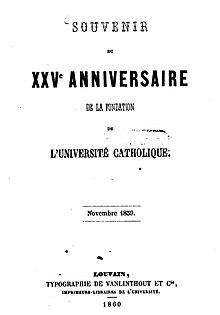

In addition to its main campus in Leuven, it has satellite campuses in Kortrijk, Antwerp, Ghent, Bruges, Ostend, Geel, Diepenbeek, Aalst, Sint-Katelijne-Waver, and in Belgium's capital Brussels.[3] KU Leuven is the largest university in Belgium and the Low Countries. In 2021–22, more than 65,000 students were enrolled, with 21% being international students.[4] Its primary language of instruction is Dutch, although several programs are taught in English, particularly graduate and postgraduate degrees.[5][6] It is routinely ranked among the top 50 universities in the world by Times Higher Education.[7]
Although Catholic in theology and heritage, KU Leuven operates independently from the Church.[8] KU Leuven previously only accepted baptized Catholics,[when?] but is now open to students from different faiths or life-stances.[9][10]
While nowadays only the acronymic name KU Leuven is used, the university's legal name is Katholieke Universiteit Leuven, officially Katholieke Universiteit te Leuven,[b] which translates in English as Catholic University of Leuven.[a] However, the acronymic name is not translated in official communications, like its similarly named French-language sister university Université catholique de Louvain (UCLouvain).
The different universities in Leuven
The town of Leuven was the seat of three different universities.
Old University of Leuven
The Old University of Leuven (or Studium Generale Lovaniense) was founded in 1425 by Duke John IV of Brabant, the civil authorities of Brabant, as well as the municipal administration of the city of Leuven,[11] despite the initial opposition of the chapter of Sint-Pieter.[12] For centuries, the university flourished due to the presence of famous scholars and professors, such as Adriaan Florenszoon Boeyens (Pope Adrian VI), Desiderius Erasmus, Johannes Molanus, Juan Luís Vives, Andreas Vesalius and Gerardus Mercator.
After the French Revolution, the university was formally integrated into the French Republic when the Holy Roman Emperor, Francis I, ceded then Austrian Netherlands to France by the Treaty of Campo Formio[13] signed on 17 October 1797. A law dating to 1793, which mandated that all universities in France be closed, came into effect.[14] The old University of Leuven was abolished by decree of the Département of the Dyle on October 25, 1797.[15]
State university of Leuven
A few years after French rule came to an end, when Belgium was part of the United Kingdom of the Netherlands, king William I of the Netherlands founded in 1817 a secular university in Leuven, the State university of Leuven, where many professors of the old University of Leuven have taught. This university was abolished in 1835.
Catholic university
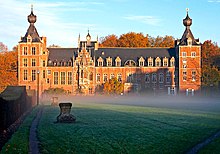
The Catholic University of Leuven was founded in 1834 in Mechelen[16] by the bishops of Belgium, after an official Papal Brief of Pope Gregory XVI. This new Catholic university stayed only briefly in Mechelen, as the bishops already moved the university headquarters to Leuven on 1 December 1835, where it took the name Catholic University of Leuven. This occurred after the closure of the State university of Leuven in 1835, where many professors of the old University of Leuven have taught. KU Leuven is generally (but controversially) identified as a continuation of the older institution; controversy lays in the fact that this link to the old University cannot be maintained from a purely juridical perspective[17] as the old University was suppressed under French rule.[c] In its statutes, KU Leuven officially declares against the rulings of the Court of Cassation[18] and the Cour d'Appel, to be the continuation of the Studium Generale Lovaniense established in 1425,[19] and together with UCLouvain it sets out to celebrate its 600th anniversary in 2025.[20] The original establishment during Medieval times and subsequent re-foundation at a later period represents a fate shared by the University of Leuven (KU Leuven) with several other well-known European universities that experienced the upheavals of revolutionary times. In 1920, the Catholic University of Leuven for the first time admitted female students,[21] lagging some 40 years behind the Belgian universities of Brussels, Liège and Ghent.[22]
Present-day university
In 1968, tensions between the Dutch-speaking and French-speaking communities led to the splitting of the bilingual Catholic University of Leuven into two "sister" universities, with the Dutch-language university becoming a fully functioning independent institution in Leuven in 1970, and the Université catholique de Louvain departing to a newly built greenfield campus site in the French-speaking part of Belgium. KU Leuven's first rector after the split was Pieter De Somer.
In 1972, the KUL set up a separate entity, Leuven Research & Development (LRD), to support industrial and commercial applications of university research. It has led to numerous spin-offs, such as the technology company Metris, and manages tens of millions of euros in investments and venture capital.[23]
The university's electronic learning environment, TOLEDO, which started in September 2001, was gradually developed into the central electronic learning environment at the KUL. The word is an acronym for TOetsen en LEren Doeltreffend Ondersteunen (English: "effectively supporting testing and learning"). It is the collective name for a number of commercial software programs and tools, such as Blackboard. The project offers the Question Mark Perception assignment software to all institution members and has implemented the Ariadne KPS to reuse digital learning objects inside the Blackboard environment.
On 11 July 2002, the KU Leuven became the dominant institution in the "KU Leuven Association" (see below).
KU Leuven is a member of the Coimbra Group (a network of leading European universities) as well as of the LERU Group (League of European Research Universities). Since November 2014, KU Leuven's Faculty of Economics and Business is accredited by European Quality Improvement System, which is a leading accreditation system specializing in higher education institutions of management and business administration.[24] As of academic year of 2012–2013, the university held Erasmus contracts with 434 European establishments. It also had 22 central bilateral agreements in 8 countries: the United States, China, South Africa, Japan, the Democratic Republic of Congo, Vietnam, Poland, and the Netherlands. The vast majority of international EU students came from the Netherlands, while most non-EU ones come from China.
KU Leuven is financially independent from the Catholic Church. Although a representative from the Church sits in its Board of Governors, their function is observational and has no voting power. Its management and academic decisions are similarly autonomous.[8]
In December 2011, the university changed its official name to KU Leuven in all official communications and branding.[25][26] While its legal name remains to be Katholieke Universiteit Leuven, the university uses its short name or acronym, KU Leuven, in all communications, including academic research publications.[2] The long name is only used in legally binding documents such as contracts and only on the first instance, according to university's communication guidelines. According to its then rector, the change is intended as a way to emphasize its history of freedom of academic inquiry and its independence from the Church, without erasure of its Catholic heritage.[25]
Since August 2017, the university has been led by Luc Sels who replaced former rector Rik Torfs. The Belgian archbishop, André-Joseph Léonard is the current Grand Chancellor and a member of the university board.
KU Leuven hosts the world's largest banana genebank, the Bioversity International Musa Germplasm Transit Centre, that celebrated its 30th anniversary in 2017 and was visited by Deputy Prime Minister and Minister for Development Cooperation, Alexander De Croo.[27]
In 2018, a student of African origin, Sanda Dia, died during a cruel hazing ritual to enter the Reuzegom fraternity.[28] The perpetrators, whose parents mostly belong to the upper class,[29] are being prosecuted, but were so far only lightly sanctioned by the university authorities.[30][31] As a consequence of these events, which attracted international media coverage,[32] the institution received criticism as to how it handled the matter. In 2023 18 students were fined 400 Euros and community service for their involvement in the death and the degrading treatment.[33]
Historically, the Catholic University of Leuven has been a major contributor to the development of Catholic theology. The university is dedicated to Mary, the mother of Jesus, under her traditional attribute as "Seat of Wisdom", and organizes an annual celebration on 2 February in her honour. On that day, the university also awards its honorary doctorates. The neo-Gothic seal created in 1909 and used by the university shows the medieval statue Our Lady of Leuven in a vesica piscis shape. The version used by KU Leuven dates from the 1990s and features the date 1425 in Times New Roman.
Campus
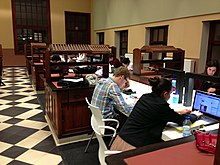
KU Leuven's main campus is in Leuven where school faculties, libraries, institutes, residence halls, the university hospital UZ Leuven, and other facilities are interspersed throughout the city proper, as well as just outside its ring road in Heverlee borough.[34] Its intercultural meeting center Pangaea is located in the city center. The University Sports Centre is located in Heverlee, including Univ-Fit gym. In addition, the UNESCO World Heritage Site Groot Begijnhof, a historic beguinage in the south of city, is owned by the university and functions as one of its many residence halls.
Public transport within the city is primarily served by the De Lijn bus system. Leuven is a main hub in Belgium's and nearby country's train network. Leuven station is located in the northeast edge of the city.
KU Leuven has campuses in Kortrijk, Antwerp, Ghent, Bruges, Ostend, Geel, Diepenbeek, Aalst, Sint-Katelijne-Waver, Brussels.
Organization and academics
Academics at KU Leuven is organized into three groups, each with its own faculties, departments, and schools offering programs up to doctoral level. While most courses are taught in Dutch, many are offered in English, particularly the graduate programs.[35] Notable divisions of the university include the Institute of Philosophy and the Rega Institute for Medical Research.
The students of the university are gathered together in the student's council Studentenraad KU Leuven.[36]
Libraries
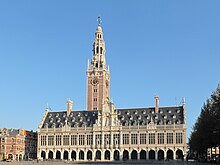
KU Leuven has 24 libraries and learning centers across its 12 campuses, containing millions of books and other media. Its theology library alone hold 1.3 million volumes, including works dating from the 15th century.[37] The following libraries are found at its Leuven campus:[38]
- 2Bergen — Biomedical Library
- 2Bergen — Campuslibrary Arenberg (exact sciences, engineering sciences, industrial engineering sciences, bio—engineering sciences, architecture and kinesiology and rehabilitation sciences)
- Artes — Ladeuze & Erasmushuis (Humanities & Social Sciences Group and the Faculty of Arts)
- Library of Psychology and Educational Sciences
- Law Library
- Library of Social Sciences
- Library of the Institute of Philosophy
- AGORA Learning Centre
- EBIB Learning Centre
- MATRIX (music and audio recordings library)
- Maurits Sabbe Library (Library of the Faculty of Theology and Religious Studies)
University hospital
Universitair ziekenhuis Leuven (UZ Leuven) is the teaching hospital associated with the KU Leuven. Its most well known and largest campus is Gasthuisberg, which also houses the faculty of pharmaceutical sciences and most of the faculty of medicine.
Breakthrough and notable research
KU Leuven scientists have managed to produce a solar hydrogen panel, which is able to directly convert no less than 15 per cent of sunlight into hydrogen gas, which according to them is a world record.[39][40][41][42] In the solar hydrogen panel the hydrogen and oxygen evolution reactions are performed in the gas phase in cathode and anode compartments separated by a membrane. Anion exchange membranes provide an alkaline environment enabling the use of earth abundant materials as electrocatalysts.[40]
According to IEEE Spectrum in 2019 this is a giant leap from 0.1% efficiency 10 years earlier.[42]
This technology bypasses the conversion losses of the classical solar–hydrogen energy cycle where solar power is first harvested via a solar panel and only then to converted to hydrogen with electrolysis plants.
Affiliations
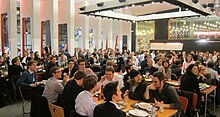
Since July 2002, thirteen higher education institutes have formed the KU Leuven Association. Members include:[43]
- KU Leuven
- LUCA School of Arts
- Odisee
- Thomas More
- UC Leuven Limburg
- Vives
KU Leuven is a member of a number of international university affiliations including the League of European Research Universities, Coimbra Group, UNA Europa, Universitas 21, and Venice International University, among others.
The university is a member of the Flanders Interuniversity Institute of Biotechnology. The Interuniversity Microelectronics Centre is a spin-off company of the university.
Rankings
| University rankings | |
|---|---|
| Global – Overall | |
| ARWU World[44] | 95 (2022) |
| CWUR World[45] | 107 (2023) |
| CWTS World[46] | 58 (2023) |
| QS World[47] | 61 (2024) |
| Reuters World[48] | 7 (2019) |
| THE World[49] | 42 (2023) |
| USNWR Global[50] | 50 (2022-23) |
| National – Overall | |
| ARWU National[44] | 2 (2022) |
| CWTS National[46] | 1 (2023) |
| CWUR National[45] | 1 (2023) |
| QS National[47] | 1 (2024) |
| THE National[49] | 1 (2023) |
| USNWR National[50] | 1 (2022-23) |
As of 2021, KU Leuven ranks in the world 45th in the Times Higher Education rankings, 84th according QS World University Rankings, 97th according to the Shanghai Academic Ranking of World Universities.[49][44][47] KU Leuven ranked first in Thomson Reuters' list of Europe's most innovative universities four times in a row since it began in 2016.[51] As of 2019, also ranks 52nd according to the CWTS Leiden Ranking and 56th according U.S. News & World Report Best Colleges Ranking.[6][52]
According to QS World University Rankings by Subject in 2019, KU Leuven ranked within the world's top 50 universities in the following fields: Sports-related Subjects (11), Theology (14), Dentistry (17), Classics and Ancient History (22), Library and Information Management (23), Psychology (24), Statistics and Operational Research (26), Mechanical Engineering (30), Philosophy (31), Geography (34), Pharmacy & Pharmacology (35), Education and Training (36), Law (37), Social Policy and Administration (39), Development Studies (43), Materials sciences (45), Chemical Engineering (46), Politics (49), Sociology (50), Life Sciences and Medicine (56), Social Sciences and Management (60), Arts and Humanities (61), Engineering and Technology (61). Also according to QS, many other KU Leuven programs rank within the top 100 in the world, including Linguistics, English Language and Literature, History, Anatomy and Physiology, Architecture, Anthropology, Computer Science and Information System, Biological Sciences, Civil and Structural Engineering, Electrical and Electronic Engineering, Business and Management Studies, Mathematics, Economics and Econometrics, Chemistry, Accounting and Finance .[53]
| Year | World university ranking | European university ranking | World reputation ranking |
|---|---|---|---|
| 2011 | 86 (QS  21) | 119 (THE) 21) | 119 (THE) | 35 (QS  14) | 37 (THE) 14) | 37 (THE) | |
| 2012 | 68 (QS  18) | 67 (THE 18) | 67 (THE  52) 52) | 24 (QS  11) | 17 (THE 11) | 17 (THE  20) 20) | 81-90 (THE) |
| 2013 | 82 (QS  14) | 58 (THE 14) | 58 (THE  9) 9) | 31 (QS  7) | 13 (THE 7) | 13 (THE  4) 4) | 81-90 (THE  ) ) |
| 2014 | 77 (QS  5) | 61 (THE 5) | 61 (THE  3) 3) | 29 (QS  2) | 17 (THE 2) | 17 (THE  4) 4) | 71-80 (THE  ) ) |
| 2015 | 82 (QS  5) | 55 (THE 5) | 55 (THE  6) | 96 (ARWU 6) | 96 (ARWU  ) ) | 31 (QS  2) | 13 (THE 2) | 13 (THE  4) | 32 (ARWU 4) | 32 (ARWU  ) ) | 71-80 (THE  ) ) |
| 2016 | 82 (QS  ) | 35 (THE ) | 35 (THE  20) | 90 (ARWU 20) | 90 (ARWU  6) 6) | 31 (QS  ) | 12 (THE ) | 12 (THE  1) | 32 (ARWU 1) | 32 (ARWU  ) ) | 51-60 (THE  ) ) |
| 2017 | 79 (QS  3) | 40 (THE 3) | 40 (THE  5) | 93 (ARWU 5) | 93 (ARWU  3) 3) | 26 (QS  5) | 12 (THE 5) | 12 (THE  ) | 32 (ARWU ) | 32 (ARWU  ) ) | 51-60 (THE  ) ) |
| 2018 | 71(QS  8) | 47 (THE 8) | 47 (THE  7) | 90 (ARWU 7) | 90 (ARWU  3) 3) | 21 (QS  5) | 14 (THE 5) | 14 (THE  2) | 31 (ARWU 2) | 31 (ARWU  1) 1) | 71-80 (THE  ) ) |
| 2019 | 48 (THE  1) | 86 (ARWU 1) | 86 (ARWU  4) 4) | 15 (THE  ) | 28 (ARWU ) | 28 (ARWU  3) 3) | 51-60 (THE  ) ) |
Rectors
| # | Name | Began office | Ended office | Studies | Vice-rector |
|---|---|---|---|---|---|
| 1 | Pieter De Somer | 1968 | 1985 | Medicine | |
| 2 | Roger Dillemans | 1985 | 1995 | Law | |
| 3 | André Oosterlinck | 1995 | 2005 | Engineering | |
| 4 | Marc Vervenne | 2005 | 2009 | Theology | Mark Waer |
| 5 | Mark Waer | 2009 | 2013 | Medicine | |
| 6 | Rik Torfs | 2013 | 2017 | Canon Law | |
| 7 | Luc Sels (nl) | 2017 | Economics |
The founding brief of the Catholic University of Belgium of Pope Gregory XVI, of December 12, 1833. |
Venerabiles Fratres Salutem et Apostolicam Benedictionem. Majori certe solatio affici non possumus, quam cum eos, qui in partem solicitudinis Nostrae sunt vocati, pastorali zelo flagrare, acriterque ad spirituale commissarum sibi Ovium bonum novimus vigilare. Licet porro praecipuam Fraternitatum Vestrarum virtutem satis jam multa declarassent eaque de causa jure Nobis laetari liceret ; conceptam tamen animo Nostro opinionem confirmarunt, Nostrumque gaudium abunde auxerunt obsequentissimae Litterae, quas die decimaquarta proxime elapsi Mensis ad Nos dedistis, et quibus ne dum Vestrum de Catholica in Belgio constituenda, et a Vobis tantum regenda Studiorum Universitate consilium significastis, sed etiam expositis commodis, quae tum animarum salus, tum Religio ipsa inde possunt accipere, Apostolica Nostra Auctoritate probari illud voluistis. Hanc Vos rationem sequuti, id egistis, quod ab antiquis temporibus consuetudo induxit, quodque debita huic Sanctae Sedi reverentia et observantia merito exigit. Cum enim ad Romanos Pontifices pro concredito Ipsis Apostolici Officii munere maxime pertineat Catholicam Fidem tueri sanctaeque ejus doctrinae depositum integrum ac intemeratum custodire; Eorum quoque esse debet Sacrarum Disciplinarum, quae publice in Universitatibus traditur,[54] institutionem moderari. Atque haec causa fuit cur Catholici etiam Principes, cum de hujusmodi Academiis, seu Universitatibus Studiorum statuendis cogitarunt, Apostolicam Sedem consulendam, Ejusque Auctoritatem exquirendam duxerint. Hinc celebriores, illustrioresque Europae Universitates nonnisi ex sententia et assensu Romanorum Pontificum fuisse constitutas gravissimae illarum historiae amplissime testantur. Nobis itaque quibus persuasum est ex recte comparatis Studiorum Universitatibus plurimum emolumenti in Christianam Rem publicam dimanare, jucundius nihil accidere potest, quam ut Vobis gratificemur et ad litterarum praesertim Sacrarum praesidium et incrementum Supremae Nostrae auctoritatis robur adjiciamus, atque hinc sapientissimum, quod una simul inivistis consilium, adprobamus, Vestramque ea de re solicitudinem summa laude, ac commendatione prosequimur. Eo autem libentius Vestris votis annuimus, quo certius Vestra industria, opera et cura futurum confidimus, ut quotquot ad istam Universitatem convenient bene morati juvenes, non scientia, quae inflat, sed scientia, quae cum charitate aedificat, non sapientia hujus saeculi, sed sapientia cujus initium timor Domini est, imbuantur. At illud probe intelligitis, Venerabiles Fratres, memoratam mox Universitatem ita quidem constitui oportere, ut nihil prorsus derogetur juribus, quae singulis Episcopis circa Clericorum in suis Dioecesanis seminariis institutionem, eorumque in Litteris, et disciplinis maxime Theologicis eruditionem Tridentini Patres adjudicarunt. Agite igitur, et Ille, a quo omne datum optimum, ac omne donum perfectum est, dexter Vobis, propitiusque adsit, et quae salubriter cogitastis, feliciter possitis implere. Interim Apostolicam Benedictionem Paternae Nostrae charitatis, et benevolentiae testimonium erga Fraternitates Vestras, peramanter Vobis impertimur.Datum Romae apud S. Petrum die 13 Decembris An. 1833. Pontificatus Nostri An. III. Gregorius PP XVI |
Notable alumni
- Leon Bekaert (b. 1958), economics, businessman
- Paul Bulcke (b. 1954), economics, businessman, CEO of Nestlé
- Jan Callewaert, economics, founder of Option N.V.
- Peter Carmeliet, physician and medical scientist
- Mathew Chandrankunnel (b. 1958), professor of philosophy of science at Dharmaram Vidya Kshetram
- Mathias Cormann (b. 1970), Belgian-born Australian senator and Minister for Finance
- Jo Cornu, engineer, previous CEO of the National Railway Company of Belgium
- Joan Daemen (b. 1965), cryptographer, one of the designers of Advanced Encryption Standard (AES).
- Frans C. De Schryver (b. 1939), chemist
- Julien De Wilde (b. 1967), civil engineer, businessman
- Noël Devisch (b. 1943), agriculture
- Shelton Fabre (b. 1963), American Roman Catholic bishop
- Gabriel Fehervari (b. 1970) law, businessman
- Willy Geysen, law, head of the Centre for Intellectual Property Rights (CIR)
- Thomas Hertog (b. 1975) physics, cosmologist
- Jozef IJsewijn, prominent as a key founder of Neo-Latin studies
- Suriya Evans-Pritchard Jayanti, American diplomat, U.S. Department of State
- Abdul Qadeer Khan (b. 1936), founder of Pakistan's Nuclear Program
- Koen Lamberts (b. 1964), President and Vice-Chancellor, University of Sheffield (United Kingdom)
- Koen Lenaerts, law, president of the European Court of Justice
- Georges Meekers (b. 1965), Belgian-born wine writer and educator
- Simon Mignolet (b. 1988), goalkeeper
- Gerald Misinzo, molecular biology, Tanzanian veterinary virologist and professor
- Martin Moors, philosopher
- Rudi Pauwels (b. 1960), pharmacologist, co-founder of Tibotec and Virco
- Vincent Rijmen (b. 1970), cryptographer, one of the designers of Advanced Encryption Standard (AES).
- Willy Sansen (b. 1943), electrical engineer, academic, and author.
- Guðmundur Steingrímsson (b. 1972), Icelandic politician
- Francine Swiggers, economics, businesswoman
- Wu Rong-i, economics, former Vice Premier of Taiwan, Taiwanese politician
- Andreas Utermann, finance, former CEO of Allianz Global Investors
- Jef Valkeniers, doctor and politician
- Astrid van Oyen, archaeologist and professor
- Marc Van Ranst (b. 1965), physician, virologist
- Herman Van Rompuy (b. 1947), Belgian statesman, appointed President of the European Council in November 2009
- Frans Vanistendael, law
- Catherine Verfaillie (b. 1957) physician, stem cell scientist
- Koen Vervaeke (b. 1959), history, diplomat
- Albert Ziegler SJ (1927-2022), Swiss theologian, ethicist and author
- Isaac Wardell (b. 1979), musician, composer
Honorary doctorates
Notable recipients of honorary doctorates at the KU Leuven include:
- Albert II of Belgium (1961), King of the Belgians
- James P. Allison (2017), Immunologist, Nobel Prize in Physiology or Medicine 2018
- Timothy Garton Ash (2011), British historian and Professor of European Studies, University of Oxford
- Michelle Bachelet (2015), President of Chile
- Abhijit Banerjee (2014), Indian economist, Massachusetts Institute of Technology
- Patriarch Bartholomew I of Constantinople (1996)
- Baudouin of Belgium (1951), King of the Belgians
- Roberto Benigni (2007), Italian actor, comedian, screenwriter and director of film, theatre and television.
- John Braithwaite (2008), Australian criminologist (application of the idea of restorative justice to business regulation and peacebuilding)
- Manuel Castells (2004), Professor of Sociology, Open University of Catalonia, University of Southern California
- Leon O. Chua (2013), professor in the electrical engineering and computer sciences department at the University of California, Berkeley
- Carla Del Ponte (2002), former Chief prosecutor of two United Nations international criminal law tribunals
- Jared Diamond (2008), professor of Geography and Physiology, UCLA
- Jacques Derrida (1989), French philosopher
- John Kenneth Galbraith (1972), Canadian economist
- Nadine Gordimer (1980), South African author, Booker Prize 1974, Nobel Prize in Literature 1991
- Alan Greenspan (1997), economist, former chairman of the Board of Governors of the US Federal Reserve
- Eugène Ionesco (1977), Romanian and French playwright
- Ban Ki-moon (2015), Secretary-General of the United Nations
- Helmut Kohl (1996), former Chancellor of Germany
- Christine Lagarde (2012), Managing Director of the International Monetary Fund (IMF)
- Mario Vargas Llosa (2003), Peruvian writer
- Angela Merkel (2017),[55] German politician, Chancellor of Germany
- Michael Marmot (2014), British epidemiologist, University College London
- Martha Nussbaum (1997), American philosopher, University of Chicago
- Dirk Obbink, Lecturer in Papyrology and Greek Literature at Oxford University and the head of the Oxyrhynchus Papyri Project.
- Roger Penrose (2005), professor in Mathematical Physics, University of Oxford
- Navi Pillay (2012), United Nations High Commissioner for Human Rights
- Thomas S. Popkewitz (2004), professor of curriculum theory, University of Wisconsin-Madison School of Education
- Mary Robinson (2000), former President of Ireland
- Jacques Rogge (2012), President of the International Olympic Committee (IOC)
- Oscar Arnulfo Romero (1980), archbishop of San Salvador (El Salvador), human rights activist
- Helmut Schmidt (1983), former Chancellor of Germany
- Nate Silver (2013), American author and statistician
- Fiona Stanley (2014), Australian epidemiologist
- Rowan Williams (2011), Archbishop of Canterbury
Bibliography
- 1860 : Souvenir du XXVe anniversaire de la fondation de l'Université catholique: Novembre 1859, Louvain, typographie Vanlinthout et Cie, 1860 Souvenir du XXVe anniversaire de la fondation de l'Université catholique: Novembre 1859.
See also
Footnotes
References
External links
 Media related to Katholieke Universiteit Leuven at Wikimedia Commons
Media related to Katholieke Universiteit Leuven at Wikimedia Commons- Official website
- (in Dutch) KU Leuven: History of KU Leuven / KU Leuven, zes eeuwen geschiedenis
- International Ranking of Katholieke Universiteit Leuven (2008)


